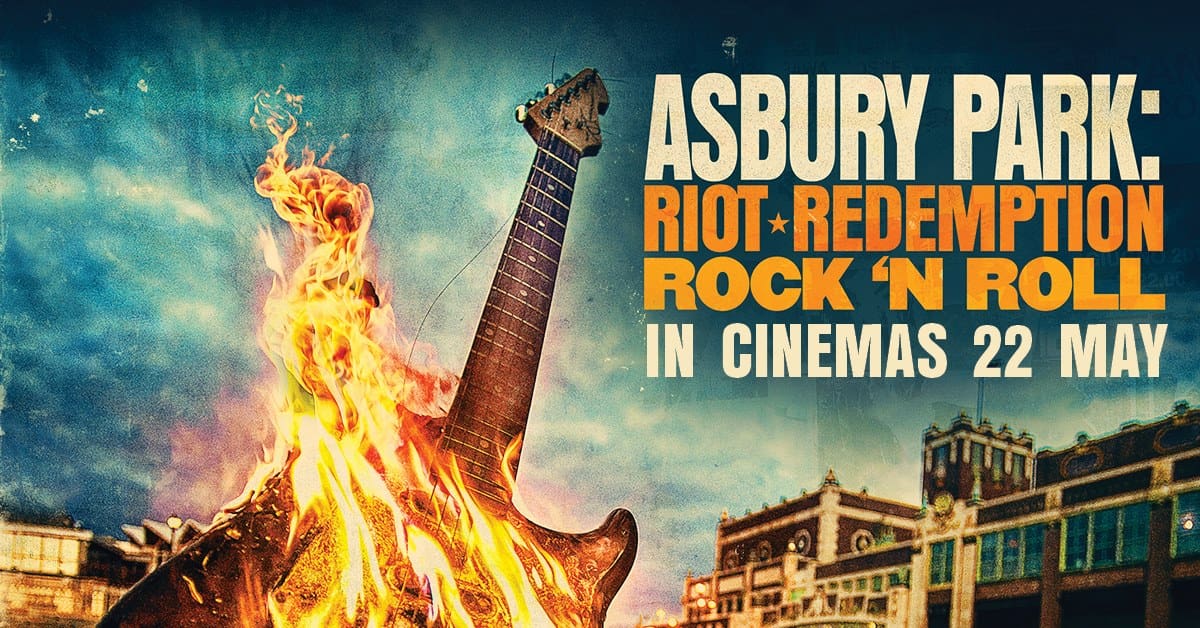Asbury Park: Riot, Redemption, Rock ‘n’ Roll is an unexpected documentary.
If you know (or don’t know) Asbury Park’s story you’re aware that this once famed city by the sea, which eventually became synonymous with Bruce Springsteen, went through decades of absolute hell. The once booming boardwalk spent years boarded up and vacant. Kevin Smith’s Dogma, Darren Aronofsky’s The Wrestler, and most explicitly, Anthony Bourdain’s No Reservations all illustrate the desolation, destruction, and depression of the city that Bruce built. And in the past decade, thanks to the synergy of copious corporate funds, audacious entrepreneurs, and wildly creative artists the city has returned to its former glory.
And that’s why this film is so unexpected. Read, or watch any piece of media on Asbury Park from the past three years and it is the same story over, and over again — the prodigal city hath returned from ruin, and is now the vibrant playground for the hip and trendy. That’s what this documentary seemed to be on the surface — another pat on the back for Asbury Park.
However, while Asbury Park: Riot, Redemption, Rock ‘n’ Roll does celebrate the rebirth of Asbury Park, it does not hold back in pointing a very real problem this city has experienced since its founding — a racial and cultural divide.
Yes, there’s plenty of love for Bruce Springsteen, Steven Van Zandt and Southside Johnny. But, equally as important as the music that sprung from The Upstage Club, and The Stone Pony is the fact that Asbury Park has been, and is still a very flawed city. It’s a city divided by railroad tracks — a physical representation of a barrier where progress, equality, and prosperity has rarely crossed. And this documentary is not afraid to point that out, and point it out loudly.
It’s a much-needed wake up call to those who have recently adopted Asbury as “their town” and a reminder to those who’ve been there long enough to know that just because the east side is doing well, the west side still hurts to this day.
The filmmakers are smart in their approach to delivering this message — they weave it into the story of this city’s staggering musical history. It tells tales of West Side clubs that most didn’t even know existed, and how that sound influenced the men that became synonymous with the sounds of Asbury Park.
The sound of these men is examined at great length, as one would expect. The interviews with Bruce, Southside, and Little Steven are not only wildly engrossing, but they’re also the Trojan horse the filmmakers use to get the audience to their social message. The interviews, particularly with these three men, are used not to retell tales of when they all broke out and experienced massive success. It’s the story of them as up-and-coming struggling musicians — jamming, hanging out, experiencing life at the Jersey Shore — tales you’ll hear from any artist who calls the city their homebase today. It’s equally fascinating to hear them candidly talk about the Asbury riots, racial and social inequalities in the city, as it is their days jamming at The Pony of The Upstage.
The documentary also gives major, and deserved credit to the LGBTQ+ community of the city, for being the catalysts for Asbury’s rebirth. This often something overlooked by many who see corporate dollars, and international advertisers planting their flag in the city. It’s an important, and sometimes overlooked aspect of Asbury’s history.
However, as a firsthand witness to the “redemption” of Asbury, there’s not a lot of emphasis on the “down times” of Asbury, post-riot. Yes, there was mentions of historic buildings being torn down because of greed and politics, and the complete ignoring of rebuilding a decimated Springwood Avenue. However, the point of just how bad this got — and how those bad times were not that long ago are not driven home enough. The rebirth of this city is remarkable because it was not that long ago when the boardwalk was boarded up with no one on the beaches in the middle of the summer, and the downtown looked like a post-apocalyptic nightmare.
Yet, this wasn’t really the point of this documentary, and the criticisms are more based on personal experience, not on the film’s quality or theme. em>Asbury Park: Riot, Redemption, Rock ‘n’ Roll is able to tell a tale about the musical history of this city, awaken a lot of people about the injustice and inequality that has and still occurs, and focus on the people who are trying to make a difference in the community — through the power of music.
Asbury Park: Riot, Redemption, Rock ‘n’ Roll is an excellent, and necessary film for people who hold Asbury Park close to their hearts. It’s a reminder of the real problems that exist in this city, as well as how music has, and can bring people together and maybe get everyone on the path for a better future.
Asbury Park: Riot, Redemption, Rock ‘n’ Roll hits select movie theaters for one night only on May 22. Click here for ticket information.
https://youtu.be/cPMEJwFvZUY


